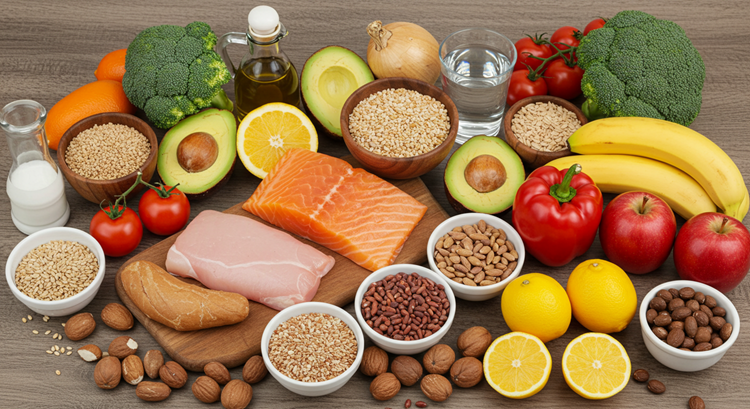A nutrition program can be explained as a procedure for eating healthy and growth-promoting food. With the changing way of life in cities, every additional person is actually surrounded by unhealthy foods or junk food temptation, but none of these unfit meals works the way a well-balanced diet will.
The Importance of a Balanced Diet
A great or well-balanced diet with regard to healthy living is really a benefit for every age group, especially for all those spending several hours in the fitness center or other activities. It is a common fact that nutritional diet plan intake is filled with benefits for each category of individuals and facilitates growth in teenagers as well as kids whilst helping to maintain wholesome and fit bodies in adults.
Understanding Nutrition Beyond Protein
Before going to nourishment-filled food and the essential things inside a nutrition plan, you must understand that nutrition doesn’t only imply having plenty of protein with the day or even throwing calories from your life to skip meals or consume less. Nutrition or a nutrition program is a process where a complete combination of all nutrients should be present in the daily diet, i.e., you can’t just bypass carbohydrates or even fat from your food consumption.
The Role of Complete Nutrition
Mostly, people involved with workouts often suffer from weakness as well as late post-workout recovery because of incomplete nourishment intake. You might have protein supplements, but the body is still lacking in nutrition for that absence associated with other essential ingredients of the perfect nourishment program. A body needs a well-balanced combination of the three primary ingredients of the nutrition plan, i.e., protein, carb, and body fat. Along with one of these three primary components, a nourishment program also includes vitamins and minerals and an adequate quantity of water consumption.
Dos and Don’ts of a Nutrition Program
An excellent nutrition program contains vital actions or items to be looked after, as it will help ensure the body gets total nutrition and doesn’t lack key components. However, some things should not be done to stabilize and flourish your dietary intake.
What Not to Do:
Don’t begin the nutrition program without physical exercise like working out, biking, or walking.
Don’t skip meals (breakfast every day or your meal).
Don’t depend just on dietary supplements and alternatives for reducing your weight or attaining muscle strength.
Don’t skip or even subtract the three primary ingredients pointed out.
The Mistake of Eating Less
Another large mistake people make in the name of nutrition or a healthy diet is consuming less or even staying fast throughout the day (with only fruit consumption). Frequently, eating much less or absolutely nothing slows or wrecks the body’s metabolism.
Key Elements of a Nutrition Program
Probably the most essential things inside a complete nourishment program tend to be minor, however:
5–6 meals daily.
A little bit of everything.
Managing calories to some level or even intake associated with good body fat.
Losing is associated with water intake throughout the day.
Adding fiber-rich food.
Including fruits and vegetables in every day’s intake.
Benefits of Frequent Meals
Experts think that for significant health and nutritional consumption, one has to eat more than three meals daily. These meals should be 5 to 6 in number and less within quantity; these small foods should also contain a well-balanced ratio of all vital elements. This step of the nutrition program helps you stop extra food cravings or requirements for food and puts a finish to hunger. This can also help boost the body’s metabolic process and facilitate the digestion program.
The Role of Fats in Nutrition
People are generally afraid of fat consumption and often shift toward fat-free or low-fat food items, but body fat has a vital role in a nutrition diet plan. Fat supplies energy, stamina, and oil to the bones, muscle tissue, tissues, and cells in your body.
Types of Fats
Saturated fat
Polyunsaturated fat
Monounsaturated fat
Importance of Monounsaturated Fat
Monounsaturated fats are essential and good fats required by the body for growth, robust joints and bones, building stamina, and maintaining a good cholesterol level. Sources include olive, canola, and seafood oils.
Water: The Key to Metabolism and Digestion
The objective of a nutritious diet isn’t just to provide health insurance and growth to somebody but to maintain its essential functions such as metabolism and digestion. Adequate consumption of water per day works in the direction of helping your body carry out these features successfully.
Water prevents the body from dehydrating and acts as a cleanser for body poisons. It is also required to aid the breakdown of valuable ingredients.
Conclusion
A well-structured nutrition program is essential for promoting overall health, enhancing physical performance, and ensuring proper growth and recovery for individuals of all ages. It is not just about consuming specific nutrients like protein but maintaining a balanced diet that includes carbohydrates, fats, vitamins, minerals, and adequate water intake.


